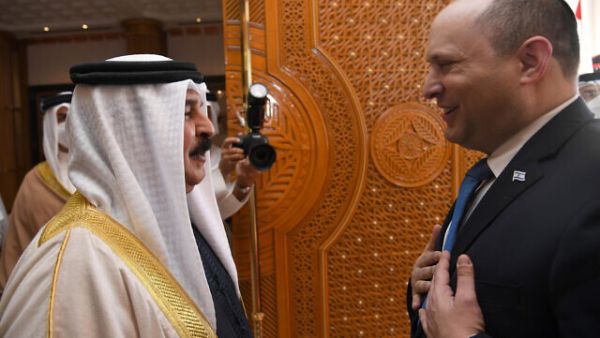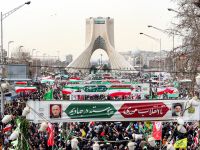Israel is turning to the Gulf. The Gulf is turning to Israel. Both seek a rapprochement, and this has been the situation for a long time. Obviously, when you talk about this you have to deduct Kuwait, definitely, maybe Qatar and to a large and confusing degree Saudi Arabia which is trying its best to stay on the sidelines though many keep saying it would like to normalise but won't.
However, outwardly among these, and now for a long-time have been the United Arab Emirates, Bahrain and Oman although the latter states it is satisfied with the present underlying "chummy", long-time, rubbing-shoulders relationship with Israel. But this is not satisfactory to the UAE and Bahrain who have since stated they want a "healthy", "bombastic" relations with Israel and its different institutions and society.
IDF F-15 fighter jets escorted an American B-52 bomber through Israel's skies on its way from the Gulf earlier today.
— Israel Defense Forces (@IDF) February 14, 2022
The joint flight shows our close cooperation with the @usairforce and the importance of maintaining Israel's security & stability in the Middle East. ???? pic.twitter.com/5vwKKKLgp8
And this relationship have been quickly garnished soon after Manama and Abu Dhabi signed the Abraham Accords in Washington in September 2020 with the then Israel prime minister Benjamin Netanyahu. These two Gulf states wanted to open all doors, lift so to speak, an iron curtain and let relations commence on many different levels: Political, diplomatic, economic, trade, professionals and many, many fields.
In the case of the UAE, the unlocking chain started soon after Abu Dhabi signed a peace agreement with thousands of Israeli tourists suddenly flocking to Dubai. In one year after the signing, trade between the two countries hit the 1-billion-dollar-mark; and both sides want the figure to jump to $2 billion. There is no time to wait!
There is one major obstacle in the way of Israel delivering air defences to the Gulf: the United States.
— Middle East Eye (@MiddleEastEye) February 13, 2022
The US perceives the region as its sphere of interest. It has a military presence and bases in Qatar, Bahrain and the UAE https://t.co/DO29S4ZOKx
Further, diplomatic relations have been rife. Both Israeli President Isaac Herzog and Prime Minister Naftali Bennett visited the UAE, and palatially received by the Abu Dhabi Crown Prince Mohammad Ben Zayed with relations going top notch.
However, Israel stated its objections when the American's wanted to sell F-35 jet planes to the UAE despite the willingness of Trump to allow the deal to go-ahead. That may speak volumes about Israeli meddling in US policy.
It may show also Israel's contradictory stand especially under the new Israeli government lead by Naftali Bennett who is now willing to sign defence cooperation agreements with Bahrain as marked by his latest visit to Manama.
Bahrain's Crown Prince Salman bin Hamad Al-Khalifa has accepted an invitation to visit Israel, the Gulf state's foreign minister said on Tuesday. https://t.co/qiO22Q2QLn
— The New Arab (@The_NewArab) February 16, 2022
But this maybe as well because Bahrain hosts the US 5th Navy Fleet and has just recently embarked on naval exercises with the participation of 60 countries including Saudi Arabia, UAE, Oman and off course, Israel. No more politics as we know it, but its now about cultural security at the expense of normative views and analysis.
In addition, a senior Israeli military officer is being stationed in Manama as part of this security coordination and plateau between the USA, Bahrain and now the new Jewish partners. This as well, has been given the seal of approval by Benny Gantz, the Israeli Defence Minister during his last trip to Bahrain.
"The U.S. Navy is considering adding unmanned Israeli boats to its joint Middle East operations, a U.S. official said earlier in the day, a move that could deepen Israel's military involvement in the Gulf," reports @DanWilliams. https://t.co/JfHssRvvar
— Mike (@Doranimated) February 15, 2022
Thus, it would appear that Israeli normalization with these two Gulf states is going full-speed ahead. Unlike the normalization between Egypt and Israel and later Jordan and the Jewish states establish decades ago, the present process is far different today. There is a sense of alacrity, robustness and to "hell with old ideas."
Both Abu Dhabi and Manama want a "warm" normalization with Israel because of Iran and its perceived influence in different parts of the Arab region like Yemen and its support for the Houthis. Its a region based on money and interest.
A new channel of communication has been opened for Türkiye with Israel and the Gulf states.
— Turkish Politics ?? (@TurkishPolitics) February 16, 2022
Especially in the new conjuncture following the Arab Spring back in 2010, Türkiye conflicted with these countries in terms of politics and principles. pic.twitter.com/bIxoH2PJzj
With Israel on their side both feel the Persian tide would be stemmed with extra security guarantees and may just 'dampen' the ballistic missile attacks launched on the UAE recently from Houthis sites in Yemen thousands of kilometers away.
But the problem with the argument about 'Israel in the Gulf' is that this critical oil region is already heavily militarized.
Its high scoring military points dominated by the American military in bases on Bahrain, UAE, Qatar right up the Shatt Al-Arab estuary in Kuwait and this is enough signals to warn the Persian neighbor.
'Israeli PM Bennett and DM Gantz both visiting the US Navy's Fifth Fleet in Bahrain is sending a clear message to Iran about US support for Israel and Gulf security,' @DrMichaelOren tells i24NEWS
— i24NEWS English (@i24NEWS_EN) February 15, 2022
'The region is prepared to defend itself from a nuclear-armed Iran' pic.twitter.com/MGq2d59mDX
In the final analysis, the US is already facing Iran. And thus what extra protection can Israel provide maybe tenuous, self-serving and based on changing the political, economic and cultural paradigm of the region. As well, Israel's presence in the Gulf can only serve to heighten tension and escalation and say "we are at the heart of the Arab lands'.







